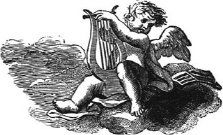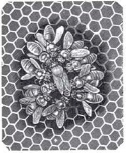Weird But True (6 page)
O
n a roadside in Grünstadt, Germany, a young man flagged down a passing car. When a female driver stopped to help him, he unfolded a map and asked her for directions. Distracted by the map, she didn't notice when he reached into the car and swiped her wallet. After she pointed out the route he was looking for, in a gentlemanly gesture, he kissed her hand and thanked her. When she discovered her wallet had been lifted, she went to the police, who swabbed the back of her hand and collected enough DNA evidence to identify the crook.
T
he protein composition of a woman's saliva changes as she ages.
C
hanges in hormone levels make it harder for a woman to sing when she's pregnant. Rising hormones affect the vocal folds so more lung pressure is needed to hit certain notes.

P
ossibly the world's most famous lullaby, the song that begins “Lullaby, and good night” was written by Johannes Brahms, who never married and had no children.

N
S-RED stands for Nocturnal Sleep-Related Eating Disorder, also known as “sleep eating.” Not only do sufferers leave their beds and wander around in their sleep, they make their way to the fridge and chow downâthen remember nothing the morning after!
* * *
NS-RED affects twice as many women as men.

B
esides burrowing into mattresses, pillows, carpeting, and upholstered furniture, bedbugs can live in wood furniture, behind electrical outlets, under wallpaper, and inside picture frames, clocks, electronics, and smoke detectors.
* * *
When they feed, bedbugs can consume six times their body weight in human blood.
J
ames Harrington, a political philosopher and friend of England's King Charles I, was imprisoned in the Tower of London in 1660. During his incarceration he came to believe that his perspiration turned into flies and bees.

K
arl-Axel Ekbom, a Swedish neurologist, published a detailed documentation of “delusional parasitosis” in 1938. His work was so significant that the disorder came to be known as Ekbom's Syndrome.
* * *
Ekbom also coined the term “restless legs syndrome” to describe the sensation of itching or creeping under the skin that compels a person to move her legs. RLS is sometimes referred to as Wittmaack-Ekbom Syndrome, named in part for German physician Theodor Wittmaack, who studied the disease in the 1850s.
P
eople with the psychological disorder Ekbom's Syndrome believe they're infested with parasites crawling on and under their skin. The sensation is so real that they can both feel and see the imaginary bugs.

E
kbom's Syndrome, or delusional parasitosis, is also known as formication. (Read that word carefully!)
* * *
Formica is the Latin word for “ant.”

T
he building and surfacing material Formica was originally developed as insulation material for electrical devices. At the time, insulation was made mainly from the mineral mica. The new material was a substitute “for mica”âand that's how it got its name.
* * *
Daniel J. O'Conor and Herbert A. Faber were the Westinghouse engineers who developed Formica. When they filed their patent in 1913, the company paid them one dollar for the rights to their invention. They quit and set up their own business soon after.

W
illiam Procter, a candle maker, and James Gamble, a soap maker, went into business together because their father-in-law, Alexander Norris, suggested it. In 1837 they created the company known as Procter & Gamble.
P
rocter & Gamble's first major product was Ivory Soap, invented in 1879 by Gamble's son, James N. Gamble. It was named by Procter's son, Harley T. Procter, inspired by a passage from the Bible: Psalms 45:8, which refers to "ivory palaces."

I
vory Soap floats because there's air whipped into the mixture. This makes the soap lighter than water (and easy to find in the tub!).
Y
ou'll always remain afloat in quicksand because the human body is less dense than the sand. So you can get stuck, but you won't drown.
* * *
The “quick” in “quicksand” comes from the Middle English word that means “living,” because the sand gives the impression of being alive.
T
rying to yank someone out of quicksand never works: You'd have to tug with the same force required to lift a mid-size car. If you are trapped in quicksand, small, subtle movements will liquefy the sand around your body, making it easier to extract yourself.
